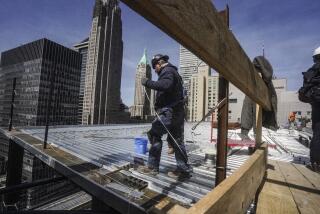Rising Demand for Execs Makes Headhunting Business Bountiful
- Share via
The competition to recruit up-and-coming corporate executives and managers has turned red-hot.
Propelled by a strong U.S. economy that has bolstered the confidence of the business world, employers are scrambling for talent. The aim is to bolster management ranks stretched thin by the downsizing waves of past years as well as to bring in leaders capable of developing new lines of business.
The booming executive search business reflects the trend. Executive Recruiter News projects that the industry will grow at an average annual pace of 13% through 2000. The biggest firms are growing even faster, at a rate of more than 20%, and many can’t keep up with demand, said Tom Rodenhauser, managing editor of the trade publication.
“The recruiters we’re talking to are turning away business,” he said.
One major problem, many experts say, is the shallow pool of executive candidates who have a good grasp of the emerging technology and global competition issues facing major businesses. The short supply of talent is blamed on previous downsizings that shrank middle management ranks and narrowed career-development opportunities at many U.S. companies.
All told, the competition for top talent is “more fierce than I’ve ever seen,” said Caroline W. Nahas, a 20-year veteran of the executive search business and the managing vice president for Los Angeles-based Korn/Ferry International, the No. 1 firm in the headhunter industry.
At times, Nahas said, the growing use of stock options has combined with a soaring stock market to complicate efforts to lure executives and managers away from their current employers. Many corporate leaders who have seen the on-paper value of their options skyrocket don’t want to leave until they are fully vested and can realize the profits.
As a result, Nahas said, many employers find they have to do such things as pay cash signing bonuses to compensate the new recruits for what they give up when they leave stock options behind.
For the very top corporate jobs, though, executives appear more willing than ever to jump ship. Likewise, corporate boards increasingly are tapping outside candidates for top posts instead of promoting insiders, and they are quick to oust executives who don’t fulfill expectations.
This Work Hazard Has Teeth
Evander Holyfield, the heavyweight boxing champ whose ears were chomped by Mike Tyson, is hardly the only one who has gotten bitten by another person while on the job.
In fact, recently released federal figures on occupational injuries show that 957 private sector workers--mostly in the health care and nursing home industries--reported being bitten by patients or other people while on duty during 1995. The 957 reported cases included only those where workers lost at least one day of work as a result of their injuries.
Job-safety advocates say many biting incidents involve patients who are mentally ill or upset that they are not getting adequate medical attention. These advocates blame, among other things, staff cutbacks at health-care facilities and a lack of action by management to protect nurses and other workers.
“It’s a very stressful environment, not only for the worker but also for the patients,” said Bill Borwegen, health and safety director of the Service Employees International Union, which represents more health-care and nursing home workers than any other U.S. labor organization.
Biting and other assaults, along with such ailments as back injuries caused by lifting or moving patients, have made nursing home and health-care facilities among the nation’s most hazardous work sites.
Debate on Wages Still Rages
The nation’s strong employment growth has given advocates of minimum-wage increases something to crow about.
In a report released this month, the liberal Economic Policy Institute contended that last October’s 50-cent rise in the federal minimum wage to $4.75 an hour did what it was supposed to do: boost the earnings of low-income families without undermining the creation of new jobs.
Likewise, California’s economic recovery and job gains have remained on track since the state’s minimum wage rose to $5 an hour in March. What’s more, with both the federal and state minimum wages scheduled to rise again in coming months and talk in Washington of an effort to approve more increases, the economics of minimum wages remains a live topic.
But opponents still argue that minimum-wage increases slow job growth and do little to help the poor. They say the negative effects of the most recent federal increase have been masked by the nation’s powerful economic recovery.
“In a declining economy, we’d see a greater impact,” said Martin A. Regalia, chief economist for the U.S. Chamber of Commerce. Still, Regalia concedes that minimum-wage increases today appear to do “somewhat less” damage to job creation today than 15 or more years ago.
More to Read
Inside the business of entertainment
The Wide Shot brings you news, analysis and insights on everything from streaming wars to production — and what it all means for the future.
You may occasionally receive promotional content from the Los Angeles Times.










